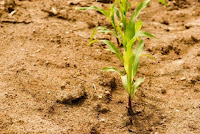A new study from the University of California, Irvine and the University of Washington shows that water conserved by plants under high CO2 conditions compensates for much of the effect of warmer temperatures, retaining more water on land than predicted in commonly used drought assessments.
According to the study published this week in the Proceedings of the National Academy of Sciences, the implications of plants needing less water with more CO2 in the environment changes assumptions of climate change impacts on agriculture, water resources, wildfire risk, and plant growth.
The study compares current drought indices with ones that take into account changes in plant water use. Reduced precipitation will increase droughts across southern North America, southern Europe and northeastern South America. But the results show that in Central Africa and temperate Asia -- including China, the Middle East, East Asia and most of Russia -- water conservation by plants will largely counteract the parching due to climate change.
"This study confirms that drought will intensify in many regions in the future," said coauthor James Randerson, UCI professor of Earth system science. "It also shows that plant water needs will have an important influence on water availability, and this part of the equation has been neglected in many drought and hydrology studies."
Recent studies have estimated that more than 70 percent of our planet will experience more drought as carbon dioxide levels quadruple from pre-industrial levels over about the next 100 years. But when researchers account for changes in plants' water needs, this falls to 37 percent, with bigger differences concentrated in certain regions.
The reason is that when Earth's atmosphere holds more carbon dioxide, plants actually benefit from having more of the molecules they need to build their carbon-rich bodies. Plants take in carbon dioxide through tiny openings called stomata that cover their leaves. But as they draw in carbon dioxide, moisture escapes. When carbon dioxide is more plentiful, the stomata don't need to be open for as long, and so the plants lose less water. The plants thus draw less water from the soil through their roots.
...
Is this good news for climate change? Although the drying may be less extreme than in some current estimates, droughts will certainly increase, researchers said, and other aspects of climate change could have severe effects on vegetation.
Read more at Climate Change Has Less Impact on Drought than Previously Expected

No comments:
Post a Comment